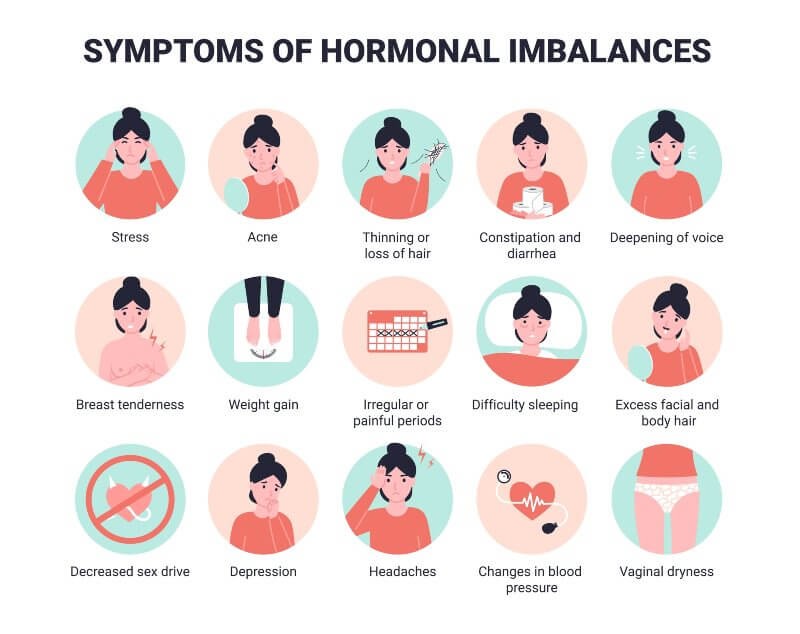Hormonal imbalance or hormone disorders in women is a problem caused due to the lack or increase of certain hormones, which may have harmful effects on the body. Hormones are chemicals that regulate the organs way of communication with one another. An alteration or error in this communication can cause several problems.
Function of Hormones in women
Hormones are important for regulating different processes in our bodies. An imbalance occurs when too many or very few hormones are produced and released into the bloodstream, affecting a cascade of things that are vital for the body to function well, such as; metabolism, appetite, sleep, sexual and reproductive functions, regulating body temperature, mood, and in general hormone levels. Naturally basic hormone levels are different for different stages in life according to the natural physiological process of ageing and the different phases of development one goes through.
Hormonal imbalance symptoms in females

Some basic hormonal balance differences occur in women’s’ different life stages, reaching puberty, pregnancy and menopause. These changes are often temporarily, and hormones return to their normal basic levels or to their new basic level according to their phase in life.
However, if the following symptoms occur there may be a hormonal imbalance that isn’t transient or normal and an endocrinologist should be consulted.
- Irregular and extremely from the norm deviating menstrual cycles.
- Reduced libido in women.
- Tendency to depression and unexplained fatigue
- Weight gain, some hormonal imbalances cause women to crave carbohydrate-rich food or sweets and make her gain weight.
- Hair loss
- Osteoporosis (weak fragile bones)
- Difficulty to conceive and dyspareunia (painful intercourse)
- Excess hair for instance on abdomen or face.
- Skin problems.
Hormonal imbalance treatment
Treatment of hormonal imbalance in females depends on the underlying cause. Each case should be investigated, diagnosed and treated individually.
Some of the possible treatments are;
- Hormones regulating menstruation and pregnancy like progesterone and estrogen. These come in the form of injections, pills, patches and suppositories.
- Hormone replacement therapy; Medicine is used to replace insufficient hormone levels for instance in menopause the levels of estrogen decrease causing symptoms like night sweat and hot flashes replacing this decreased estrogen level in medication improves these annoying symptoms.
- Eflornithine can be used to treat an excess of facial hair growth due to hormonal imbalance.
- Antiandrogens also known as testosterone blockers or androgen antagonists prevent androgens (commonly known as male or masculine hormones) from mediating their effects on the female body and cause things like severe acne, excess hair growth, or increased hair loss.
- The combination of Clomiphene citrate and/or aromatase inhibitors which are used to stimulate the ovaries into maturing eggs in women with PCOS seeking pregnancy.
- Metformin is a medication used to treat type two diabetes and has shown a positive effect in minor hormone imbalances in women with PCOS.
- Levothyroxine is used to overcome symptoms of hypothyroidism and substitute thyroxin if there is a deficiency in its production by the Thyroid gland.
- Assisted reproductive technology (ART), In-vitro Fertilization (IVF) or ICSI, are used to help women with hormone imbalances seeking pregnancy.
Hormonal imbalance test
Hormone levels in blood are measured to determine if there are any problems or imbalances that could be causing infertility. These hormone tests include:
Estrogen Levels in blood
Estrogen is a hormone secreted in both men and women in varying levels, but their levels are higher in women.
Estrogen has a major role in the growth and development of the female reproductive system and other female physical characteristics.
- infertility
- Irregular or interrupted menstrual cycle.
- Early onset of menopause like symptoms
When estrogen is deficient or increased the doctor may ask for a blood test to measure its levels.
Progesterone hormone test
Progesterone is one of the most important female hormones secreted from the corpus luteum to prepare the endometrium lining for implantation after ovulation and when pregnancy occurs stimulate the formation of milk glands.
The level of progesterone in the blood is low during the menstrual cycle and rises to a peak around ovulation if no pregnancy occurs it drops, and menstruation begins.
The reasons for using progesterone testing include:
- Finding out if ovulation occurs in PCOS patients it would remain low since there is no or irregular ovulation.
- Detecting certain malignancies such as ovarian cancer.
Follicle stimulating hormone (FSH) and Luteinizing hormone (LH)
Follicle stimulating hormone (FSH) and Luteinizing hormone-(LH) are excreted from the pituitary gland in both males and females.
These hormones have a role in fertility. They stimulate ovulation and regulate the menstrual cycle in women.
The level of these hormones is measured in blood or urine and your doctor can diagnose health issues and syndromes by measuring levels of these hormones.
- Anovulatory cycles
- Estimate the ovarian the reserve in women with fertility problems
- PCOS patients have an abnormal ratio of the two hormones.
Can I get pregnant with hormonal imbalance?
Yes, treatment of hormonal imbalance in the case of infertility depends mainly on the patient having enough ovarian reserve. The chances are very high that you do get pregnant if the ovarian reserve is good. Your doctor will thoroughly discuss the chances for your individual case with you during the consultation.






